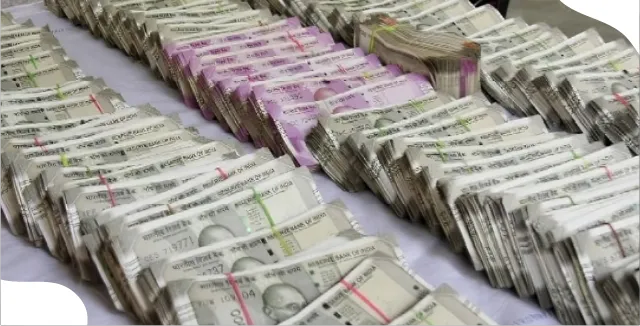What is Black Money – What It Is, Where It Comes From & How It's Tackled

Check Your Loan Eligibility Now
By continuing, you agree to LoansJagat's Credit Report Terms of Use, Terms and Conditions, Privacy Policy, and authorize contact via Call, SMS, Email, or WhatsApp
Black money is money earned through illegal means or legal income that is not reported for tax. It is usually received in cash and kept hidden to avoid paying taxes.
In the film Sivaji: The Boss, Rajinikanth’s character Shivaji faces black money while trying to do good for society. A corrupt businessman hides crores of rupees in cash, avoiding taxes and using the money for personal gain.
Here is an example of how black money may be hidden:
In such cases, the hidden income becomes black money as it is not declared to the tax authorities. Shivaji’s mission shows how black money affects the system and how recovering it can help society.
How Black Money Works in the Economy?
Black money is income on which no tax is paid. It is often earned through legal activities but kept hidden from tax authorities. This can happen when people or businesses deal in cash and avoid recording their income officially.
Examples of Black Money
- Cash Sales Without Receipts
A shopkeeper sells items worth ₹2,00,000 but issues receipts for only ₹50,000. The rest ₹1,50,000 becomes black money because no tax will be paid on it.
- Undisclosed Property Transactions
A person buys a house worth ₹1,60,00,000 but officially shows ₹40,00,000 and pays ₹1,20,00,000 in cash. That cash part is not reported and becomes black money.
Example:- Undisclosed Property Deal
In the above case, the buyer avoids paying tax on most of the property value, which leads to revenue loss for the government.
Common Sources of Black Money
- Sale of counterfeit goods
- Unrecorded cash transactions
- Illegal trades like drugs or weapons
- Piracy and fake software sales
- Tax evasion in real estate and services
Impact of Black Money on the Economy
- Reduces government income – Less tax is collected, affecting public services and infrastructure.
- Weakens financial planning – National data on income, spending, and savings becomes unreliable.
- Limits bank growth – Hidden cash does not enter banks, making it harder for others to get loans.
- Hinders honest businesses – Genuine companies face unfair competition from those using black money.
Black money damages the economy silently but seriously. Since it stays outside the legal system, it reduces trust in markets and makes planning difficult for the government. Combating black money requires strong regulation, awareness, and honest reporting by all.
Read More - Tax Planning and Tax Evasion
Harmful Effects of Black Money
Black money causes many problems in society. It often leads to more corruption. For example, when businesses earn large profits in secret, they may pay the police to ignore their illegal actions.
Over time, this can turn honest officers into corrupt ones who not only ignore crimes but also take part in them. Some people even earn black money through very wrong activities, such as human trafficking.
Unexpected Benefits of Black Money
While black money is often harmful, it has offered some relief in places where strict or unfair laws have made normal life difficult. In such cases, black money has helped people meet their needs, protect their rights, or survive in harsh systems.
Example from History
In the former Soviet Union, many everyday business activities were against the law. Shops often had empty shelves, and people could not buy basic goods.
To solve this, people turned to the underground economy. By earning and spending black money, they got access to food, clothes, and tools that were otherwise banned or unavailable.
Helping the Oppressed
In some countries, governments have treated certain groups unfairly. They banned some races from owning land, starting businesses, or investing in the stock market. These unfair rules forced many people to work in informal areas where rules were fewer.
There, they could earn black money and support their families, even when the system was against them.
How Black Money Helped in Tough Situations
In these cases, black money acted as a tool for survival. It helped people live more freely, even when the laws were harsh or unfair.
Special Ways Black Money Moves and Changes
People who hold black money often try to turn it into white money, that is, legal money. This process is called money laundering. While doing this, they try to hide the money’s illegal source. However, the law takes money laundering very seriously. Legitimate businesses must be extra careful so they do not get involved in it by mistake.
Example: How Hawala Works
One common method of money laundering is the hawala system. This is an informal way to send money across countries without using banks or paperwork.
For example, if someone in the United States wants to send $20,000 to a person in India using hawala, they give the money to a local hawala agent.
The agent contacts another agent in India, who gives the same amount (in rupees) to the receiver. No actual money crosses borders, and the exchange rate used is often much higher than the official one. Everything is based on trust and secret codes.
Common Methods and Tools for Money Laundering
Money laundering methods may seem clever, but they break the law. Authorities can impose strict penalties if someone is caught. So, knowing how these systems work helps honest people avoid risks and stay safe.
How does Black Money Affect the Economy?
Black money harms the country in many ways. When people hide income and do not pay taxes, the government collects less money.
Also Read - Top Banking Scams to Watch Out
This means less spending on public services like hospitals, roads, and schools. It also increases corruption, weakens trust in the system, and affects honest businesses.
Effects of Black Money on the Economy
Black money may seem helpful to some in the short term, but it causes long-term harm to the economy and society.
Conclusion
Black money is money that people earn but do not report to the government, often to avoid paying taxes. It usually comes from illegal activities or unrecorded business deals. Black money harms the economy by encouraging corruption and reducing tax income. Although it may sometimes help people in unfair systems, it mostly creates problems.
FAQ’s
1. What is black money?
Black money is income that people do not report to the government to avoid paying taxes.
2. How do people earn black money?
People earn black money through illegal trades, bribes, or unrecorded business deals.
3. Why is black money a problem?
Black money reduces tax collection, increases corruption, and harms the economy.
4. Can black money ever help people?
In strict or unfair systems, black money has helped some people meet basic needs.
5. How do governments fight black money?
Governments use tax checks, banking rules, and strong laws to catch and stop black money.
Other Related Pages | |||
About the author

LoansJagat Team
Contributor‘Simplify Finance for Everyone.’ This is the common goal of our team, as we try to explain any topic with relatable examples. From personal to business finance, managing EMIs to becoming debt-free, we do extensive research on each and every parameter, so you don’t have to. Scroll up and have a look at what 15+ years of experience in the BFSI sector looks like.
Subscribe Now
Related Blog Post
Recent Blogs
All Topics
Contents
Quick Apply Loan
Consolidate your debts into one easy EMI.
Takes less than 2 minutes. No paperwork.
10 Lakhs+
Trusted Customers
2000 Cr+
Loans Disbursed
4.7/5
Google Reviews
20+
Banks & NBFCs Offers
Other services mentioned in this article








